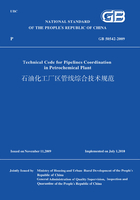
5 Designs of Underground Pipelines Coordination
5.1 General
5.1.1 Water supply piping,circulation water piping,fire fighting water piping and drainage piping should be laid underground,while the electric power cable,control/telecom cable or optical cable may be laid underground.
5.1.2 The arrangement of underground pipelines shall meet the following requirements:
1 The underground pipelines should be arranged from the architecture/structure,process facility,tank to the road,which should be arranged from shallow to deep positions per its burial depth.
2 The underground pipelines and pipe trenches without protection measures should not be arranged within the pressure impact scope of architecture/structure foundation,process facility,tank,road and rai.
3 The width and depth of excavation for pipe trench shall not impact on the architecture/structure,process facility,tank,road,railroad and existing pipelines.
4 Underground pipelines and pipe trench must not be laid in parallel with railroad.
5 Underground pipelines and pipe trench should not be laid in parallel with road surface,and pipelines with less maintenance requiments or with little damage to road surface during maintenance in case that pipelines need to be laid.
6 Direct burial underground pipelines shall not be laid in parallel or overlapped.
7 Safety and health requirements shall be met in case the potable water piping being arranged with drainage,acid/alkaline piping and piping of other toxic media.
8 Direct burial electric power cable should not be laid close to other metal piping.
5.1.3 Underground pipelines shall be arranged separately,reasonably and centralizedly according to the principle of identical pipeline type and close burial depths.
5.1.4 In design of underground pipelines coordination,the pipeline position shall comply with the following principles:
1 New pipelines yield to existing pipelines.
2 Pressure piping yield to gravity flow piping.
3 Small diameter pipelines yield to large diameter pipelines.
4 Easily bendable pipelines yield to hard to bend pipelines.
5 Temporary pipelines yield to permanent pipelines.
6 Branch pipelines yield to main pipelines.
7 Pipelines with less work quantity yield to that of larger quantity.
8 Pipelines with low technique and safety requirements yield to that with higher technique and safety requirements.
5.1.5 Following requirements shall be met in case of crossing arrangements for underground pipelines:
1 Water supply piping and cooling water piping shall be laid above the drainage piping.
2 Thermal piping shall be laid above the water supply piping and circulation water piping.
3 Electric power cable,control/telecom cable or optical cable shall be laid below thermal piping and above other piping.
4 Piping for inflammable gas and inflammable liquid shall be laid below thermal piping and above other piping.
5 Oxygen piping shall be laid below inflammable gas piping and above other piping.
6 Piping of corrosive media and drainage piping containing acid/alkaline shall be laid below other piping.
5.1.6 The overall production drainage piping shall not run through irrelevant process unit,tank farm or other facilities.
5.1.7 The configuration of vent and water-sealed well of production drainage piping shall comply with the specifications in the current applicable national standard GB 50160 Fire Prevention Code of Petrochemical Enterprise Design.
5.1.8 The pipelines of liquefied hydrocarbon,inflammable gas and inflammable liquid crossing railroad or road shall be laid in protection conduit or pipe trench,the configuration of protection conduit or pipe trench shall meet the requirements in Article 5.2.3 of this Code.
5.1.9 The above ground fire hydrant should be no less than1.0m from the edge of urban road,and should be no less than 1.0m from the road shoulder edge of double lane highway road,and shall be no less than3.0m from the centerline of single lane road.